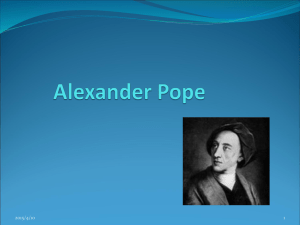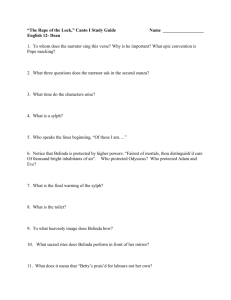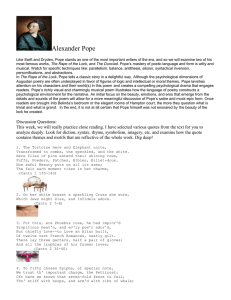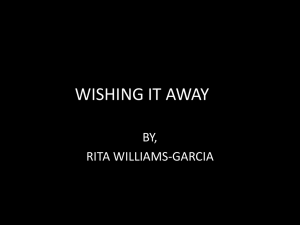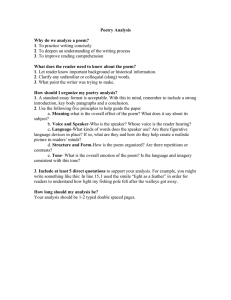Critical Essay on Rape of the Lock
advertisement
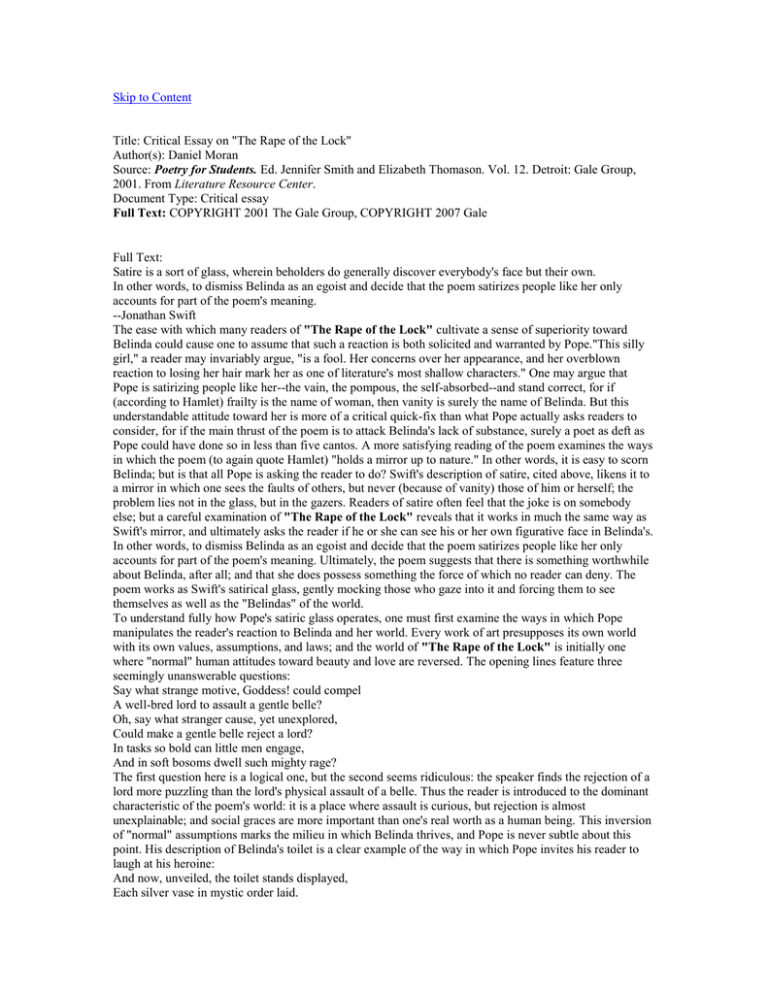
Skip to Content Title: Critical Essay on "The Rape of the Lock" Author(s): Daniel Moran Source: Poetry for Students. Ed. Jennifer Smith and Elizabeth Thomason. Vol. 12. Detroit: Gale Group, 2001. From Literature Resource Center. Document Type: Critical essay Full Text: COPYRIGHT 2001 The Gale Group, COPYRIGHT 2007 Gale Full Text: Satire is a sort of glass, wherein beholders do generally discover everybody's face but their own. In other words, to dismiss Belinda as an egoist and decide that the poem satirizes people like her only accounts for part of the poem's meaning. --Jonathan Swift The ease with which many readers of "The Rape of the Lock" cultivate a sense of superiority toward Belinda could cause one to assume that such a reaction is both solicited and warranted by Pope."This silly girl," a reader may invariably argue, "is a fool. Her concerns over her appearance, and her overblown reaction to losing her hair mark her as one of literature's most shallow characters." One may argue that Pope is satirizing people like her--the vain, the pompous, the self-absorbed--and stand correct, for if (according to Hamlet) frailty is the name of woman, then vanity is surely the name of Belinda. But this understandable attitude toward her is more of a critical quick-fix than what Pope actually asks readers to consider, for if the main thrust of the poem is to attack Belinda's lack of substance, surely a poet as deft as Pope could have done so in less than five cantos. A more satisfying reading of the poem examines the ways in which the poem (to again quote Hamlet) "holds a mirror up to nature." In other words, it is easy to scorn Belinda; but is that all Pope is asking the reader to do? Swift's description of satire, cited above, likens it to a mirror in which one sees the faults of others, but never (because of vanity) those of him or herself; the problem lies not in the glass, but in the gazers. Readers of satire often feel that the joke is on somebody else; but a careful examination of "The Rape of the Lock" reveals that it works in much the same way as Swift's mirror, and ultimately asks the reader if he or she can see his or her own figurative face in Belinda's. In other words, to dismiss Belinda as an egoist and decide that the poem satirizes people like her only accounts for part of the poem's meaning. Ultimately, the poem suggests that there is something worthwhile about Belinda, after all; and that she does possess something the force of which no reader can deny. The poem works as Swift's satirical glass, gently mocking those who gaze into it and forcing them to see themselves as well as the "Belindas" of the world. To understand fully how Pope's satiric glass operates, one must first examine the ways in which Pope manipulates the reader's reaction to Belinda and her world. Every work of art presupposes its own world with its own values, assumptions, and laws; and the world of "The Rape of the Lock" is initially one where "normal" human attitudes toward beauty and love are reversed. The opening lines feature three seemingly unanswerable questions: Say what strange motive, Goddess! could compel A well-bred lord to assault a gentle belle? Oh, say what stranger cause, yet unexplored, Could make a gentle belle reject a lord? In tasks so bold can little men engage, And in soft bosoms dwell such mighty rage? The first question here is a logical one, but the second seems ridiculous: the speaker finds the rejection of a lord more puzzling than the lord's physical assault of a belle. Thus the reader is introduced to the dominant characteristic of the poem's world: it is a place where assault is curious, but rejection is almost unexplainable; and social graces are more important than one's real worth as a human being. This inversion of "normal" assumptions marks the milieu in which Belinda thrives, and Pope is never subtle about this point. His description of Belinda's toilet is a clear example of the way in which Pope invites his reader to laugh at his heroine: And now, unveiled, the toilet stands displayed, Each silver vase in mystic order laid. First, robed in white, the nymph intent adores, With head uncovered, the cosmetic powers. A heavenly image in the glass appears; To that she beds, to that her eyes she rears. The inferior priestess, at her altar's side, Trembling begins the sacred rites of pride The emphasis on Belinda's physical vanity (the table where she applies her makeup) suggests a religious devotion to her emotional vanity: words like "mystic order," "robed in white," "powers," "heavenly," "priestess," "trembling," and "sacred rites" all combine to exaggerate the importance Belinda places on her appearance. Her beauty is her religion, and who cannot but laugh at a person so devoted to something so ephemeral and (as the adage goes) skin-deep? "Yes, I care about how I look," the sensible reader says. "But she is ridiculous!" Indeed, she is, and the description of her cosmetics' effects again stresses Belinda's lack of depth: her makeup "awakens every grace" by making a "purer blush arise" and "keener lightnings quicken in her eye." Paradoxically, only the addition of something artificial brings "purity" and "grace" to her appearance, as the world of the poem is one in which seeming is more important than substance. At this point, the reader sees only the faces of the vain in Pope's satirical mirror. After thus establishing Belinda's vanity (and soliciting the reader's amused disapproval of it), Pope throws Belinda into Hampton Court, where the inversion of "normal" values is further stressed and established as a rule: Here Britain's statesmen oft the fall foredoom Of foreign tyrants and of nymphs at home; Here thou, great Anna! whom three realms obey, Does sometimes counsel take--and sometimes tea. As he does throughout the poem, Pope here employs a zeugma, a figure of speech where unlike things are yoked together with a single verb for comedic effect: thus, the problem of "Foreign tyrants" is as terrible as "nymphs at home," and Queen Anne's "counsel" is as important as her "tea." In the world of the poem, local scandal is on a par with international upheaval, in keeping with the overall idea that the seemingly trivial parts of life (beauty, hair) are here regarded as monumental. Pope often employs a zeugma to reinforce the degree to which the values of those in the poem's world are off-kilter. For example, when Ariel runs through the possibilities of what the omen might portend, he considers: Whether the nymph shall break Diana's law, Or some frail china jar receive a flaw. Or stain her honor or her new brocade, Forget her prayers, or miss a masquerade, Or lose her heart, or necklace, at a ball; Or whether Heaven has doomed that Shock must fall. Belinda's losing her virginity ("Diana's law") is on a par with a "frail china jar"; her "new brocade" needs to be defended as thoroughly as her "honor"; forgetting "prayers" is as sinful as forgetting a "masquerade"; her "heart" and "necklace" carry equal weight, as does the fate of Shock, her lapdog. The entire poem hinges on these kinds of comparisons--in this world, losing one's hair elicits reactions like one would find in a poem about an actual rape. This is why, after the baron uses the "fatal engine" to cut the lock, he boasts of his conquest in language that only the most innocent reader could fail to read as smacking of masculine sexual triumph: What Time would spare, from Steel receives its date, And monuments, like men, submit to fate! Steel could the labors of the Gods destroy, And strike to duct the imperial towers of Troy; Steel could the works of mortal pride confound, And hew triumphal arches to the ground. What wonder then, fair nymph! they hairs should feel The conquering force of unresisted Steel?" These words belong more in the mouth of a theatrical Roman soldier, fresh from the ravishing of a virtuous virgin, than that of a spiteful playboy. Of course, that is part of Pope's design: as the words of the title are incongruous and zeugmatic so are the characters' motives and reactions. Both the baron and Belinda respond to the rape with language more suited to an actual act of violence and terror than the cutting of one's hair. Belinda's reaction to her rape sounds like the one Thomas Hardy's Tess Durbeyfield would make almost two-hundred years later, after her literal rape by Alec D'Urberville: Happy! ah, ten times happy had I been, If Hampton Court these eyes had never seen! Yet am I not the first mistaken maid, By love of courts to numerous ills betrayed. But any pity one could have for Belinda is immediately undercut by the fact that she never denies her own beauty--the only thing she seems to have learned is that Hampton Court is a rough place, not that one's appearance is hardly worthy of all this trouble. She describes herself as a victim of her own beauty, one too perfect for the imperfect world in which her admirers live. So the reader presses on, feeling superior to the superficial Belinda and confident that he or she can laugh at her, rather than with her. As the reader gazes into the glass of satire, he or she still sees only the face of Belinda. The reader's sense of superiority is heightened when he or she reads the speech of Clarissa in Canto V. Leaping out of the poem as the apparent voice of reason, she admonishes the zeugmatic values of those around her and urges Belinda to consider her virtue instead of her vanity: How vain are all these glories, all our pains, Unless good sense preserve what beauty gains; That men may say when we the front box grace, "Behold the first in virtue as in face!" . . . Beauties in vain their pretty eyes may roll; Charms strike the sight, but merit wins the soul. This is exactly the kind of "literary moral pill" that many readers like to swallow: it tells the reader what he or she already suspects while simultaneously patting him or her on the back for having suspected it in the first place. It offers sound advice: beauty and charms only please one's senses, but a person's worth is much more important. The inversion of values that has characterized the poem seems momentarily halted, as if Pope is calling a time out before wrapping things up. However, the question remains: Who is really listening to these words of sense? Surely not Belinda or any of the other characters, who begin their final melee of dirty looks and slanderous accusations without showing any signs of heeding Clarissa's advice. But also deaf to Clarissa's advice is Pope himself, who transforms the lock into a constellation, destined to hover in the heavens forever. The poem's last ten lines, where Pope speaks directly to his heroine, contain the poem's greatest surprise and expand the breadth of Pope's satire: Then cease, bright nymph! to mourn thy ravished hair, Which adds new glory to the shining sphere! Not all the tresses that fair head can boast, Shall draw such envy as the Lock you lost. For, after all the murders of your eye, When, after millions slain, yourself shall die: When those fair suns shall set, as set they must, And all those tresses shall be laid in dust, This Lock the Muse shall consecrate to fame, And 'midst the stars inscribe Belinda's name. These lines force the reader to reevaluate his or her attitude toward Belinda. Pope's attitude toward her seems very much like the reader's: he placates her by appealing to her vanity, telling her that her lock will forever "draw such envy"; she is, in effect, immortalized. However, the question remains of why, if Belinda is so superficial, she is rewarded at the end of the poem with her own constellation? The answer is simple: she is beautiful. Despite what readers may have been taught by their parents and teachers about a person's looks (and locks) being unimportant, despite the reader's mounting his or her high horse throughout the poem, despite Clarissa's sage advice, and despite even Pope's own attempts to portray her as the most shallow of coquettes, Belinda does possess something--like the stars--that is nonetheless inspiring. Merit may "win the soul" (as Clarissa remarks), but beauty ignites it. Only the insensible would deny the powers of beauty, and only the reader looking for an easy moral could read Pope's poem and feel wholly superior to Belinda at its end. Scorning Belinda is effortless, but turning Swift's glass of satire to the readers' own faces--and thus seeing how Belinda's reward is one that cannot be denied her--demands more from a reader solely interested in seeing only Belinda's face in the satirical glass. Part of the overall joke therefore lies in the fact that, because of the reader's own vanity, he or she may have a difficult time seeing him or herself in Belinda. She may be unbearably vain, but only slightly more so than other people--for who will deny that he or she is susceptible to the powers of beauty, whether in the night sky or the face of a fellow human being? Gazing into Swift's mirror and finding other people ridiculous only serves to assuage the very egos that readers might fault Belinda for possessing. Rather, everyone, in a sense, is a "Belinda": a lover of beauty who finds it inspiring and fascinating. If not, why would anyone spend time gazing at the Mona Lisa, admiring Michelangelo's David, listening to Mozart's symphonies, or reading poems as wonderfully crafted as Pope's? Everyone knows they are supposed to live by Clarissa's words, and, much of the time, they do. But it is impossible to deny that readers are also entranced by the very beauty that they say is so trivial when reading the poem. At the end of George Orwell's 1984, Winston Smith is finally brainwashed into submission by the Totalitarian Party; the famous last sentences read, "He had won the victory over himself. He loved Big Brother." Like Winston, Pope's reader may try to rebel against the great concern for beauty shared by the characters--but, in the final analysis, he or she must, like Winston, submit to an undeniable power. Readers do love Belinda, precisely for the very things they claim to be unimportant as they read the poem. Only after finishing it and stepping back do they see themselves in Swift's glass. "The Rape of the Lock" is therefore not only a satire of people like Belinda, but also of those who would deny the power of her beauty. Source Citation Moran, Daniel. "Critical Essay on 'The Rape of the Lock'." Poetry for Students. Ed. Jennifer Smith and Elizabeth Thomason. Vol. 12. Detroit: Gale Group, 2001. Literature Resource Center. Web. 2 Feb. 2012. Document URL http://go.galegroup.com/ps/i.do?id=GALE%7CH1420035866&v=2.1&u=ccl_deanza&it=r&p=LitRC&sw= w Gale Document Number: GALE|H1420035866 © 2012 Gale.
